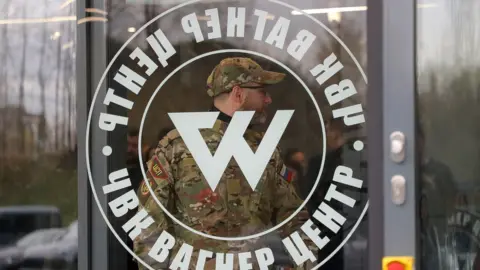Ukraine war: Russia moves to take direct control of Wagner Group
 Reuters
ReutersRussia appears to have moved to take direct control of Wagner, after months of infighting between defence officials and the private military group.
Deputy Defence Minister Nikolai Pankov said on Saturday "volunteer formations" will be asked to sign contracts directly with the ministry of defence.
The vaguely worded statement is widely believed to target the group.
But in a furious statement on Sunday, Wagner boss Yevgeny Prigozhin said his forces would boycott the contracts.
The private military group has played a major role in the war in Ukraine, fighting on the side of Russian forces.
But Prigozhin, who is said to hold political ambitions of his own, has been embroiled in a public dispute with Defence Minister Sergei Shoigu and military chief Valery Gerasimov for months.
He has repeatedly accused the pair of incompetence and of deliberately undersupplying Wagner units fighting in Ukraine.
"Wagner will not sign any contracts with Shoigu," Prigozhin said in response to a request for comment on the defence ministry's announcement. "Shoigu cannot properly manage military formation."
He insisted that his group was well integrated with the Russian military, but said that its effectiveness would be damaged by having to report to the defence minister.
While Saturday's announcement did not directly reference Wagner or any other paramilitary groups, Russian media suggested that the new contracts were a move to bring Prigozhin and his forces under control.
But the defence ministry said the move was designed to "increase the effectiveness" of Russian units fighting in Ukraine.
"This will give volunteer formations the necessary legal status, create common approaches to the organization of comprehensive support and the fulfilment of their tasks," the ministry said in a statement, adding that the contracts must be signed by 1 July.
The long-running tensions between the Wagner Group and the army have threatened to boil over in recent weeks.
Last week the group kidnapped a senior frontline army commander, Lt Col Roman Venevitin, after accusing him of opening fire on a Wagner vehicle near Bakhmut.
Lt Col Venevitin was later released, and in a video shared by Russian military bloggers he accused the group of stoking "anarchy" on Russia's frontlines by stealing arms, forcing mobilised soldiers to sign contracts with the group and attempting to extort weapons from the defence ministry.
Prigozhin called the comments - which appeared to be read from a script - "absolutely total nonsense".
He has also suggested that he is ready to deploy his troops on Russian soil, saying on Telegram that Wagner was ready to fight against insurrectionist forces in the Belgorod region.
In December, the US estimated that Wagner had around 50,000 troops fighting in Ukraine.
And the mercenary group has increasingly become a tool of Russian state power around the world. Its troops are currently believed to have been deployed in Mali, the Central African Republic,Sudan and Libya.
